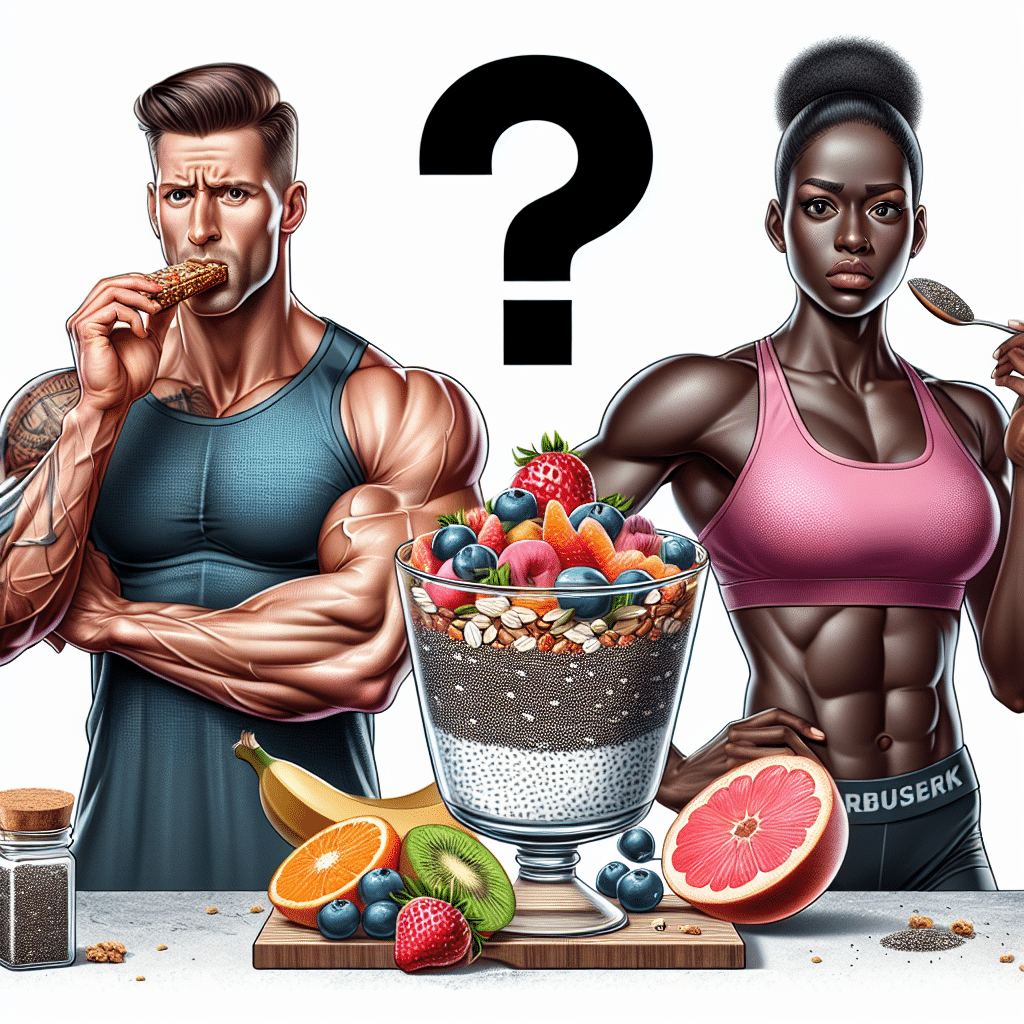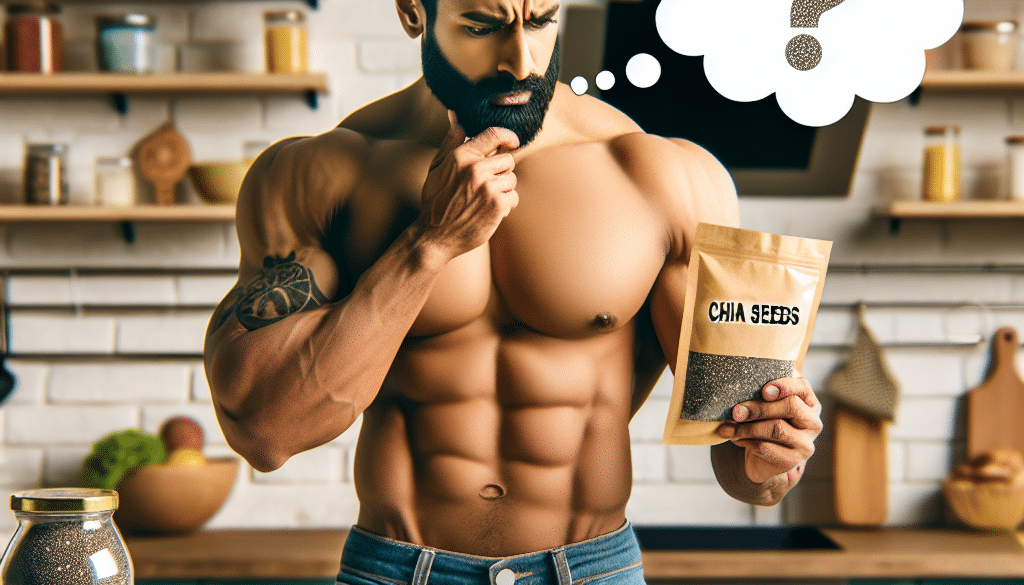Do Bodybuilders Eat Chia Seeds?
-
Table of Contents
- Chia Seeds in Bodybuilding: Nutritional Powerhouse or Hype?
- Understanding Chia Seeds
- Why Bodybuilders May Choose Chia Seeds
- Chia Seeds in a Bodybuilder’s Diet
- Research on Chia Seeds and Athletic Performance
- Case Studies and Anecdotal Evidence
- Statistics: The Rise of Chia Seeds in the Health Industry
- Conclusion: Chia Seeds in Bodybuilding
- ETprotein: Enhance Your Bodybuilding Diet with Quality Protein Products
Chia Seeds in Bodybuilding: Nutritional Powerhouse or Hype?

Bodybuilding is a sport that requires meticulous attention to diet and nutrition. The quest for the perfect balance of proteins, carbohydrates, and fats leads many athletes to explore a variety of food sources. Among these, chia seeds have emerged as a popular superfood. But do bodybuilders really eat chia seeds, and if so, what benefits do they offer to those looking to optimize their physique and performance? This article delves into the role of chia seeds in a bodybuilder’s diet, supported by research, examples, and statistics.
Understanding Chia Seeds
Chia seeds are tiny black seeds from the plant Salvia hispanica, which is related to the mint. These seeds have a rich history as a staple in the Aztec and Mayan diets, but they have gained modern popularity due to their dense nutritional profile. Chia seeds are packed with omega-3 fatty acids, fiber, protein, and various micronutrients.
Why Bodybuilders May Choose Chia Seeds
Bodybuilders often incorporate chia seeds into their diets for several reasons:
- High-Quality Protein: Chia seeds contain a significant amount of protein, which is essential for muscle repair and growth.
- Omega-3 Fatty Acids: The omega-3s in chia seeds can help reduce inflammation, which is crucial for recovery after intense workouts.
- Fiber Content: The fiber in chia seeds aids in digestion and can help maintain a healthy weight by promoting satiety.
- Antioxidants: Chia seeds are rich in antioxidants that combat oxidative stress, which bodybuilders may experience due to strenuous exercise.
- Minerals: They are a good source of minerals such as calcium, magnesium, and phosphorus, which are important for bone health and metabolic functions.
Chia Seeds in a Bodybuilder’s Diet
Bodybuilders can incorporate chia seeds into their diets in various ways:
- As a topping on oatmeal or yogurt
- Mixed into smoothies or protein shakes
- Incorporated into homemade energy bars or snacks
- Used as an egg substitute in baking for vegan bodybuilders
Despite their small size, chia seeds are versatile and can be easily added to many meals, making them a convenient option for bodybuilders with busy schedules.
Research on Chia Seeds and Athletic Performance
Several studies have investigated the effects of chia seeds on athletic performance. For instance, a study published in the “Journal of Strength and Conditioning Research” found that chia seeds did not significantly enhance performance in endurance athletes. However, other research suggests that the omega-3 fatty acids in chia seeds may improve post-exercise recovery.
It’s important to note that while chia seeds can be a beneficial addition to a bodybuilder’s diet, they are not a magic bullet. They should be consumed as part of a balanced diet that includes a variety of protein sources and nutrients.
Case Studies and Anecdotal Evidence
Many professional bodybuilders and fitness enthusiasts endorse the use of chia seeds as part of their nutritional regimen. Anecdotal evidence suggests that incorporating chia seeds into pre-workout meals or recovery shakes can help sustain energy levels and aid in muscle recovery.
However, it’s crucial to consider that individual responses to dietary supplements can vary, and what works for one athlete may not work for another. Therefore, bodybuilders should monitor their own responses to chia seeds and adjust their intake accordingly.
Statistics: The Rise of Chia Seeds in the Health Industry
The global market for chia seeds has been growing steadily. According to a report by Grand View Research, the global chia seed market size was valued at USD 66.5 million in 2018 and is expected to expand at a compound annual growth rate (CAGR) of 5.8% from 2019 to 2025. This growth is indicative of the increasing awareness of the health benefits of chia seeds among consumers, including bodybuilders and athletes.
Conclusion: Chia Seeds in Bodybuilding
In conclusion, chia seeds can be a valuable addition to a bodybuilder’s diet due to their high-quality protein, omega-3 fatty acids, fiber, antioxidants, and minerals. While they are not a standalone solution for muscle growth or athletic performance, they can complement a well-rounded diet and support overall health and recovery. Bodybuilders who choose to incorporate chia seeds into their diets should do so as part of a balanced nutritional plan tailored to their individual needs.
ETprotein: Enhance Your Bodybuilding Diet with Quality Protein Products
For bodybuilders looking to supplement their diet with high-quality protein products, ETprotein offers a range of organic bulk vegan proteins that can support muscle growth and recovery. Their products, including organic rice protein, pea protein, and various seed proteins, are characterized by a neutral taste, non-GMO, and allergen-free attributes. With L-(+)-Ergothioneine purity over 98%, ETprotein’s offerings cater to the diverse needs of the bodybuilding community.
Whether you’re looking to enhance your pre-workout shake or seeking a reliable protein source for your recovery meals, ETprotein’s extensive product range can meet your needs. Contact ETprotein to sample their products and take your bodybuilding nutrition to the next level.
About ETprotein:
ETprotein, a reputable protein and L-(+)-Ergothioneine (EGT) Chinese factory manufacturer and supplier, is renowned for producing, stocking, exporting, and delivering the highest quality organic bulk vegan proteins and L-(+)-Ergothioneine. They include Organic rice protein, clear rice protein, pea protein, clear pea protein, watermelon seed protein, pumpkin seed protein, sunflower seed protein, mung bean protein, peanut protein, and L-(+)-Ergothioneine EGT Pharmaceutical grade, L-(+)-Ergothioneine EGT food grade, L-(+)-Ergothioneine EGT cosmetic grade, L-(+)-Ergothioneine EGT reference grade and L-(+)-Ergothioneine EGT standard. Their offerings, characterized by a neutral taste, non-GMO, allergen-free attributes, with L-(+)-Ergothioneine purity over 98%, 99%, cater to a diverse range of industries. They serve nutraceutical, pharmaceutical, cosmeceutical, veterinary, as well as food and beverage finished product distributors, traders, and manufacturers across Europe, USA, Canada, Australia, Thailand, Japan, Korea, Brazil, and Chile, among others.
ETprotein specialization includes exporting and delivering tailor-made protein powder and finished nutritional supplements. Their extensive product range covers sectors like Food and Beverage, Sports Nutrition, Weight Management, Dietary Supplements, Health and Wellness Products, and Infant Formula, ensuring comprehensive solutions to meet all your protein needs.
As a trusted company by leading global food and beverage brands and Fortune 500 companies, ETprotein reinforces China’s reputation in the global arena. For more information or to sample their products, please contact them and email sales(at)ETprotein.com today.














